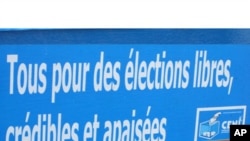In recent months, the Democratic Republic of Congo has worked hard to prepare for November 28, the country’s second national, democratic elections of the post-Mobutu era. From Matadi to Bukavu, thousands have declared for office, millions have registered to vote and untold others are helping put the needed logistical arrangements in place.
With the electoral campaign officially under way, it's clear the effort is paying off, and despite enormous challenges plans appear on track for Election Day. While these preparations must continue, the nation also must begin to look beyond the polls. The state of democracy in the Congo won't be judged by the election's mere existence, but also by the way it is conducted and by the response to its results. Thus it is important to ask: what can be done today to foster democracy in this rich beautiful country over the long term?
Democracy is, at its core, a celebration of the popular will. Through ballot boxes and polling stations, the people can choose those who they feel are best suited to lead them. But many are not chosen. During the last year, from Cote d'Ivoire to Zambia, Africa has seen every possible reaction to the democratic expression of the people’s will, from candidates’ gracious acceptance to their violent refusal.
These are historic days for the DRC. Unlike 2006, these elections are being led by the Congolese, for the Congolese. This in itself is something to be proud of, but at the same time it isn't enough. The response to the electoral results must demonstrate the same determination and commitment to democracy that has been seen so far. It is therefore crucial that all candidates – presidential and legislative alike -- place the nation's good ahead of personal gain and make three vital pledges: to renounce the use of violence, intimidation and incendiary rhetoric; to accept peacefully the will of the Congolese people; and to urge their followers to do the same.
The government has certain responsibilities as well. To ensure a free and fair election, officials must make three pledges of their own: to allow equal access to state media; to allow freedom of assembly and expression, while maintaining law and order; and to allow candidates to campaign freely and allow observers and journalists to do their jobs.
These pledges are about more than avoiding violence and bloodshed. They are, ultimately, about proving that democracy in the DRC has truly taken hold.
Congo's Democratic Road Ahead

The state of democracy in the Congo won't be judged by the election's mere existence, but also by the way it is conducted and by the response to its results.



